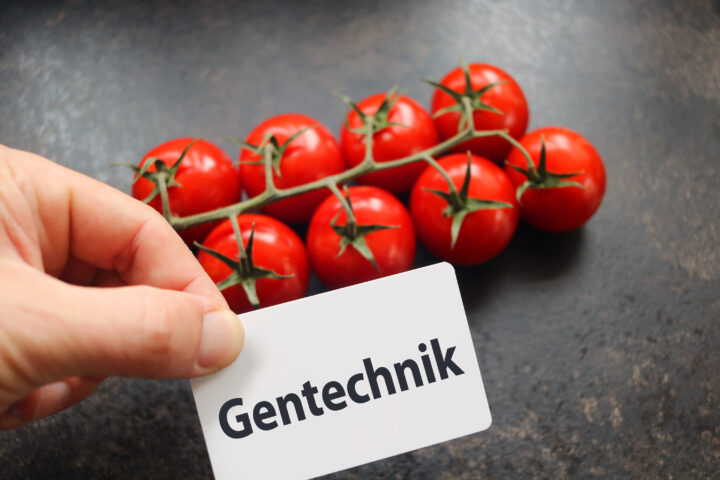
Bio Suisse rejects modern breeding methods
At their meeting in April 2023, the delegates of Bio Suisse rejected the use of new breeding methods in organic farming. With this decision, the organic association closes itself off from the possibility of becoming more productive and sustainable through modern precision breeding, such as the incorporation of disease tolerance using the CRISPR/Cas gene scissors. As reported by the "Tages-Anzeiger," the decision of the delegates was clear, and there was no real substantive debate on the topic.
Tuesday, May 9, 2023
Opinions were apparently already formed, despite recent movement in the public debate. For example, bio expert Urs Niggli has been advocating for precision breeding for some time. He tells the "Tages-Anzeiger" that food has been the result of technical interventions in nature for 15,000 years, including in organic agriculture: "Every breeding method alters the cell nucleus."
Bio relies on chemistry and radioactivity
Breeding new plant varieties, whether using conventional or new breeding technologies, always involves intervention in nature. Even in organic farming, breeding methods that aim to modify the plant genome are used. In so-called mutagenesis, plants are treated with chemicals or radioactive radiation, causing their genes to mutate randomly. Many pasta wheat varieties are based on such methods. Mutagenesis is allowed in organic farming, although it essentially involves the alteration of a large number of genes. New breeding technologies, on the other hand, are much more precise in their functionality.
Ironically, those wheat varieties that work particularly well in organic farming are based on mutagenesis. This example shows that Bio Suisse is not interested in a science-based discussion. The reasons for the rejection of new breeding technologies lie much more in marketing, according to Urs Niggli. He says, "They serve the marketing interests of Bio Suisse," in an interview with the "Tages-Anzeiger."
A selective approach to genetic engineering
Bio Suisse's relationship with conventional breeding is not always so straightforward, as not every application is rejected. When organic farming faces emergencies, it gladly resorts to methods used in conventional agriculture. For example, the most advanced biotechnological methods are allowed by Bio Suisse when there is a shortage of organic yeast or when chickens can be protected from a dangerous virus through genetically modified vaccines. On the other hand, Bio Suisse rejects genetic engineering methods that could improve animal welfare. With the CRISPR/Cas gene scissors, the killing of male chicks could be prevented by selectively breeding only female chicks.
The United Kingdom has approved genome editing for commercial purposes as long as it involves editing species-specific genes. The Swiss Parliament also intends to follow a similar path. In this context, genome editing is simply a continuation of the mutagenesis described above, with the advantage that new breeding technologies do not require chemical treatment or radioactivity and are much more precise. It is incomprehensible why Bio Suisse does not want to benefit from these advantages, as organic farmers also face the challenge of producing more with less in the future.
Sources
Tages-Anzeiger, April 18, 2023
Kindly note:
We, a non-native editorial team value clear and faultless communication. At times we have to prioritize speed over perfection, utilizing tools, that are still learning.
We are deepL sorry for any observed stylistic or spelling errors.
Related articles

ARTE documentary: Genetic engineering in organic farming?
The ARTE documentary “Genetic engineering in organic farming?” examines key controversial questions of modern agriculture: Is the general exclusion of new breeding technologies still up to date? Can the resistance of organic farming be justified scientifically?

The Great Suffering of Farmers
Fire blight, Japanese beetles, or grapevine yellows – farmers in Valais, too, are increasingly feeling helpless in the face of the threats posed by nature. More and more often, they lack the means to effectively protect their crops. This makes it all the more important for the Federal Council to place a pragmatic balancing of interests at the forefront when setting threshold values.

'Tomatoes on your eyes'
The submitted “Food Protection Initiative” calls for “GMO-free food.” Leaving aside this illusory demand, its adoption would mean more bureaucracy, more trade barriers, and less innovation. The Swiss Farmers’ Union describes the proposal as “unnecessary” and warns of a setback to the goal of achieving an even more sustainable agriculture.

How our daily lives end up in the water
When residues in our waters are discussed, agriculture is often portrayed as the main culprit. Yet a closer look shows that the sources are diverse and often much closer to everyday life than assumed.

